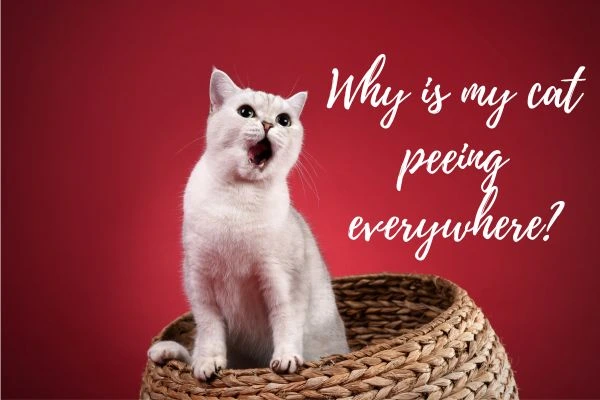Cats are extremely hygienic.
They spend most of their time licking themselves and grooming themselves.
Cats are also known to not litter anywhere except their designated places.
If you find your cat peeing anywhere except their litter box, it might be a reason for concern.
Sometimes, any deviation from their routine behavior can be a cry for help.
In this article we discuss all the possible reasons for such behavior and how to deal with it.
1. Urinary Tract Infection (UTI)
A UTI is one of the most common medical reasons for a cat to pee outside the litter box. The infection makes urination painful, and your cat may associate the litter box with discomfort, choosing to urinate elsewhere.
You might also see blood in the urine or notice your cat straining to pee. Frequent, small puddles can be a key indicator. This is a condition that needs prompt veterinary attention.
2. Bladder Stones or Crystals
Bladder stones or crystals can irritate your cat’s bladder, making urination difficult or painful. This condition may cause partial or complete urinary blockages, especially dangerous in male cats.
The discomfort may lead your cat to pee in unusual spots or vocalize while urinating. If left untreated, this issue can escalate to a life-threatening emergency.
See Also:
3. Stress and Anxiety
Cats are highly sensitive to changes in their environment. Moving to a new house, changes in routine, new pets or people, or even rearranged furniture can trigger anxiety.
A stressed cat may urinate in areas that smell strongly of their humans—like beds, laundry, or sofas—as a way to self-soothe and mark familiar territory.
4. Dirty or Unpleasant Litter Box
Cats are naturally clean animals. If their litter box is dirty, smelly, or placed in a loud or high-traffic area, they may refuse to use it. Some cats are also picky about the type of litter or dislike covered boxes.
In such cases, they may look for a quieter, cleaner spot—like your carpet or bath mat—to relieve themselves.
5. Litter Box Aversion
Beyond cleanliness, a cat may associate the litter box with negative experiences, like being startled while using it or being medicated afterward. This can cause litter box aversion.
If your cat has had a painful urination episode or feels unsafe in that space, they may avoid it completely and find a “safer” place to go.
6. Territorial Marking (Spraying)
Unneutered male cats (and sometimes females) may spray urine vertically on walls or furniture to mark territory. This is more common in multi-cat households or when stray cats are seen outside the window.
Spraying is a behavioral response, not a medical issue, and is typically associated with hormonal urges or competition.
7. Old Age and Cognitive Decline
Senior cats may start peeing outside the litter box due to cognitive dysfunction or age-related mobility issues. They might forget where the litter box is or be unable to get to it in time.
Joint pain from arthritis can also make climbing into a high-sided box difficult, leading to accidents nearby or on flat surfaces.
8. Medical Conditions Like Diabetes or Kidney Disease
Conditions like diabetes, hyperthyroidism, and kidney disease can cause excessive thirst and urination. Your cat may simply not make it to the litter box in time.
Frequent urination and large volumes are often the giveaway. If your cat is drinking more water than usual, it’s a sign to look deeper into their health.
9. Introducing New Pets or People
Bringing home a new cat, dog, baby, or roommate can cause stress and disrupt the social hierarchy in the household. Your cat may feel the need to reassert their territory through urination.
This is especially common in households where multiple cats haven’t been properly introduced.
10. Change in Routine or Environment
Even minor changes like a different work schedule, vacation, or switching litter brands can throw your cat off balance. Cats thrive on predictability.
When their routine is disrupted, some cats may express their anxiety through inappropriate urination, especially in spots that carry their human’s scent.
How to Reduce or Stop Your Cat from Peeing Everywhere?
If your cat is peeing around the house, here are effective ways to address and reduce the behavior:
-
Clean Accidents Thoroughly: Use an enzymatic cleaner to eliminate urine odors. Cats often return to the same spot if they can still smell their scent.
-
Check the Litter Box Setup: Ensure it’s clean, easily accessible, and placed in a quiet area. You may need multiple boxes in a multi-cat home.
-
Experiment with Litter Types: Some cats prefer unscented or soft-textured litter. Offer options to see what your cat prefers.
-
Reduce Stress: Keep routines consistent. Use pheromone diffusers like Feliway to help calm anxious cats.
-
Provide Enrichment: Scratching posts, toys, and playtime help reduce stress and boredom.
-
Spay or Neuter: This greatly reduces the likelihood of spraying and territorial marking.
-
Block Access to Targeted Areas: Place aluminum foil, double-sided tape, or furniture over favorite pee spots to discourage reuse.
-
Add More Litter Boxes: A good rule is one box per cat, plus one extra. Spread them out across the house.
When to Consult a Vet?
It’s important not to assume inappropriate urination is just “bad behavior.” You should consult a vet if:
-
Your cat is straining or crying when urinating
-
You notice blood in their urine
-
They’re urinating far more frequently or in large volumes
-
The behavior starts suddenly
-
They’ve recently lost weight or have increased thirst
-
They’re older and showing other signs of cognitive decline
A veterinarian can perform tests to rule out infections, stones, diabetes, or kidney issues. Timely diagnosis and treatment can prevent the issue from becoming worse—or even fatal.
Always try to understand the behavior behind your pets’ actions.
Do not jump straight into punishment.
That is how they ask for your attention.
Be patient and attentive!

Nikita Rout is a passionate content writer at HowItSee.com, where she explores the wonders of animals, nature, and the curious questions that spark our imagination. With a love for research and a knack for simplifying complex topics, she brings clarity and creativity to every article she writes. When she’s not writing, you’ll likely find her reading about animal behavior or coming up with unique pet name ideas.

